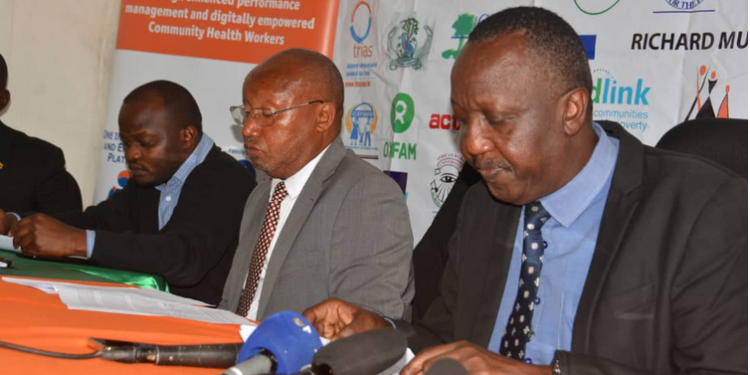By CHIMPREPORTS
By Happy Christine
Civil Society Organizations, represented by the Civil Society Budget Advocacy Group (CSBAG), convened on January 12, 2024, at PELUM Uganda Offices in Ntinda, to meticulously analyze the recently presented National Budget Framework Paper (NBFP) for the fiscal year 2024/25. The CSOs scrutinized the budget’s potential to deliver macroeconomic stability and socio-economic transformation, encapsulated under the theme of “Full Monetization of the Ugandan Economy.”
At the press conference, Mr. Jeff Wadulo, the programnet policy advisor at the Civil Society Advocacy Group (CSBAG), conveyed commendations and concerns, stating, “The government’s economic revival efforts have resulted in disbursements of UGX 2.77 trillion, supporting various sectors, including private businesses and small enterprises. However, the NBFP arrives at a crucial juncture, grappling with escalating public debt, dwindling donor support, and underabsorption of funds, posing threats to critical sectors like infrastructure, education, and healthcare.”
Despite a promising economic landscape, showcasing growth at 5.2% in FY2022/23 and projected at 6.0% by FY2023/24, the mounting public debt of UGX 96.168 trillion raises considerable concern. Fiscal indiscipline, evident through supplementary budgets, exacerbates challenges, leading to inefficient resource use and diminishing public trust in the government.
Addressing revenue challenges, the programnet policy advisor Jeff Wadulo highlighted poor performance in tax revenue collection, coupled with a reduction in donor support and global uncertainties, raising concerns about the government’s revenue streams. Despite measures to control inflation, the cautious 9.5% Central Bank rate, maintained by the Bank of Uganda, reflects geopolitical conflicts and potential volatilities in global financial markets.
As the Resource Envelope for FY2024/25 is projected at UGX 52,722.68 billion, a slight decline, the civil society organizations (CSOs) express apprehension about government expenditure, particularly the favoring of recurrent spending over development allocations. The discretionary resource envelope reduction is attributed to increased debt service obligations.
Civil Society Organizations voice concerns about insufficient funding for disaster preparedness, underfunding of the Agro-industrialization program, and inadequate allocation for Primary Health Care. Challenges such as the implementation of the new lower-level secondary curriculum, limited capacity in land management institutions, and poor funding for community mobilization functions also raise red flags.
Hasifa Naluyiga, Senior Manager Advocacy and Strategic Partnership at LivingGoods, urged the government to allocate adequate resources to the primary health care.
She emphasized, “Instead of the government spending money on drugs, it should consider investing money in awareness of people about the need for sanitization, sleeping under mosquito nets, and ensuring that people have access to clean water, thus preventing the spread of diseases such as cholera, malaria, typhoid. Therefore, will be saving the money that would have been spent on purchasing drugs to treat these diseases.”
While the Agro-industrialization program faces cuts, CSOs stress the need to invest in activities adding value to Uganda’s agricultural commodities. Additionally, the government’s commitment to primary healthcare requires increased budgetary allocation to support training, retooling, and compensating Village Health Teams.
The call for increased funding resonates across various sectors, from disaster response and land registration to community mobilization functions. Civil Society Organizations underscore the importance of adequately funding the Uganda National Bureau of Standards. Despite its critical role in maintaining international trade standards, UNBS remains underfunded, posing risks to Uganda’s exports.
As the fiscal year 2024/25 unfolds, challenges loom large. However, CSOs express optimism, emphasizing the need for government commitment, societal resilience, and collaborative efforts. CSBAG remains steadfast in promoting transparency, accountability, and fair development, asserting that collective endeavors can overcome obstacles and steer Uganda toward prosperity.







Discussion about this post